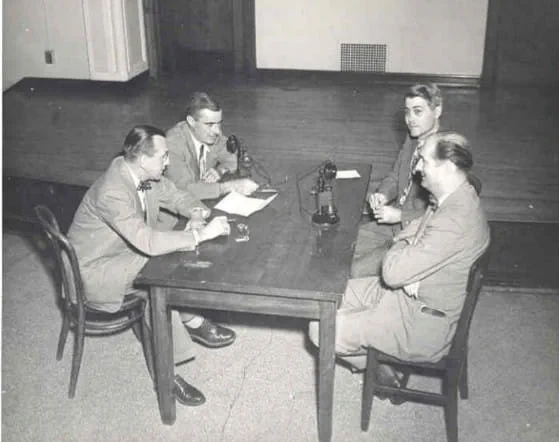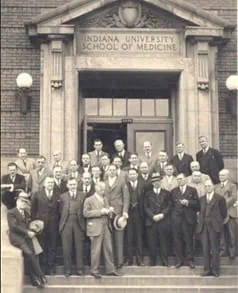Authors:
Kim M. Denny, MSEd, CHCP, Director, Office of Continuing Education in Healthcare Professions, Indiana University School of Medicine;
Richard L. Schreiner, MD, Edwin L. Gresham Professor Emeritus of Pediatrics, Indiana University School of Medicine; Retired Chairman, Department of Pediatrics; Retired Physician-in-Chief, Riley Hospital for Children at IU Health; and Chairman, Riley Hospital Historic Preservation Committee, and;
Karen Bruner Stroup, Ph.D., Retired Director, Community Education and Child Advocacy, Riley Hospital for Children at IU Health; Secretary, Riley Hospital Historic Preservation Committee
First Postgraduate Medical Education by Telephone in State and Nation presented by IU School of Medicine and Indiana State Medical Association in 1950
Today, as we are all one click away from seeing and talking with medical colleagues around the globe and are exploring the new frontiers of artificial intelligence for teaching and learning, it’s good to step back to remember just how far continuing medical education has come in a very short time.
Seventy-five years ago, the Indiana University School of Medicine partnered with the Indiana State Medical Association to make history by launching for the first time in Indiana and possibly for the first time anywhere a medical postgraduate class that was transmitted to listeners by telephone. On October 3, 1950, Dr. Lyman Meiks, Riley Hospital’s first full-time pediatric faculty member since 1931 and 10 months away from his appointment as Chairman of the Department of Pediatrics (August 1951-October1967) moderated a panel discussion between 3 Indiana University School of Medicine physicians (Dr. J. Stanley Battersby (Assistant Professor, Surgery), Dr. Byron Rust (Assistant Professor of Pediatrics), and Dr. William H. Norman (Instructor, Orthopedic Surgery Department) on “Problems Relating to Children Arising in the Practice of Medicine.” A leased telephone wire transmitted the panel discussion that was amplified for a larger audience of the Medical Staff Society of St. Elizabeth Hospital in Lafayette.
This was an experimental transmission and results showed that it was successful. A survey of comments and criticisms offered by the audience shows that the reception was clear and interest of the listeners was sustained throughout the presentation. Constructive suggestions included providing some type of visual aids for the program and providing for a two-way communication and a question-and-answer period.
The first major test followed on November 7 at 8 pm that consisted of a roundtable at which such drugs as ACTH and Cortisone were discussed, was heard by more than 600 physicians representing medical societies in 17 counties. They met at Rensselaer, Huntington, Jeffersonville, Richmond, Bloomington, Portland, Lafayette, Kokomo, Martinsville, Muncie, Franklin, Wabash, and Crawfordsville. Physicians assembled in hospitals and hotels in their own communities to receive by leased wire the latest information on modern therapeutics. Moderated by Dr. Reuben A. Solomon, M.D. (lecturer in Pharmacology and Therapeutics, Indiana University School of Medicine), the program heard by those listening was as follows: “Present-Day Status of Antibiotics,” by William M. Dugan, M.D. (Medical Staff president, Methodist Hospital), “ACTH and Cortisone,” by Glenn W. Irwin, M.D. (Dr. Irwin, future Dean of the IU School of Medicine and later Chancellor of IUPUI, joined the faculty of the Indiana University School of Medicine in 1950 as the third full-time faculty member of the Department of Medicine), “Autonomic Drugs,” by Francis G. Henderson, M.D. (Lilly Research Laboratories), “N.P.H. Insulin,” by Laura Hare, M.D. (Associate in Medicine, specialized in internal medicine), “Veratrum Alkaloids,” by Kenneth G. Kohlstaedt, M.D.(Associate Professor in Medicine and Director of the Lilly Laboratory for Clinical Research, 1945-1960).
Counties participating in the November program stated that they liked this type of seminar; it was more convenient, saved travel time and expense, and much was gained by the profession through this type of communication. Eight additional counties took advantage of the program on December 5, and arrangements were made for more than 750 physicians to listen in.
The December program was on “Chemotherapy of Urinary Tract Infections,” with Dr. Henry O. Mertz as moderator (Dr. Mertz was Chairman of the Indiana University School of Medicine’s Department of Urology from 1936-1952). Dr. Evart M. Beck (Associate Professor of Medicine) spoke on “Antibiotics”; Dr.
Evanson Byers Earp (Associate in Medicine) on Mandelic Acid and its Derivatives”; and Dr. Robert A. Garrett (Instructor in Urology, 1948-1953, named Professor and Chairman of Urology, 1953-1972) on “The Sulfa Group.”
Each program began on the first Tuesday of each month at 8 pm and continued for one hour. An announcement of the program for the 1951 series was made during the early part of December. This fledgling program was conducted through an arrangement with the telephone companies whereby a private telephone is leased in every county in the state desiring to participate. The members of the panel were then assembled before telephones located in the Indiana University Medical Center. At a signal from the school the entire network was cut in and doctors gathered before amplifiers in many cities were permitted to listen to the lectures of discussion taking place in Indianapolis.
Dr. John D. VanNuys, dean of the Indiana University School of Medicine, recognized the possibility that eventually such a postgraduate program might be presented by television; a study of the use of television in medical teaching was being made at the time by members of his staff. Further improvements on the Telephone Seminars by the medical school and State Medical Association’s committee on medical education and hospitals included considering an arrangement to enable physicians hearing the program to ask questions and the possibility of having medical authorities in other parts of the country appear by way of telephone before the seminar audiences.
Spurred by the success of the Indiana plan, some of the surrounding states attempted to create interest in this type of program with suggestions made for various states to possibly consider combining their efforts to permit a larger listening audience and the interchange of medical schools from various states.
The Indiana University School of Medicine’s history of leadership in postgraduate medical education dates back to Dr. John Barnhill, the first chairman of the Department of Otolaryngology Head and Neck Surgery, who initiated the first postgraduate course at the Indiana University School of Medicine in 1915, The “Barnhill Course, ” an anatomical and clinical postgraduate offering, is the longest continuing medical post-graduate course in the United States that is still taught to physicians from across the nation.
References
Marc G. Waggener, Lectures by Long Distance, Indianapolis Star, December 3, 1950, p. 24, accessed through Indianapolis Public Library.
Postgraduate Education by Telephone, Journal of the Indiana State Medical Association, 1950, p. 1106: https://archive.org/details/journalofindiana4311indi/page/1106/mode/2up?q=Battersby
Popularity of Telephone Seminars Grows – Available to Every Indiana County, Journal of the Indiana State Medical Association, 1950, p. 1228: https://archive.org/details/journalofindiana4311indi/page/1220/mode/2up?q=%22telephone%22
Richard T. Miyamoto, M.D. and Raleigh E. Lingeman, M.D., The History of the Department of Otolaryngology Head and Neck Surgery 1909-2016, pp. 2-3. John F. Barnhill, Encyclopedia of Indianapolis: https://indyencyclopedia.org/john-f-barnhill/
Photos:
Credit line: Photos courtesy IUI University Library Special Collections and Archives.

Title: Telephone Seminar, 1950
Link: https://iuidigital.contentdm.oclc.org/digital/collection/IUPUIphotos/id/55/rec/11
Item ID: UA24-000054
On back of photo: School of Medicine "Telephone Seminar" 1950 Emerson Hall Dr. Battersby, back (r) Additional accompanying information: Test program on Telephone Seminar to St. Elizabeth Hospital, Lafayette, Meiks, moderator; Battersby, Byron Rust, W.H. Norman; Post graduate medical education program. Subject: Problems arising in the care of newborn infants.

Title: Dr. John F. Barnhill with postgraduate otolaryngology group (front row, looking down)
Item ID: UA24-000322
Link: https://iuidigital.contentdm.oclc.org/digital/collection/IUPUIphotos/id/444/rec/18